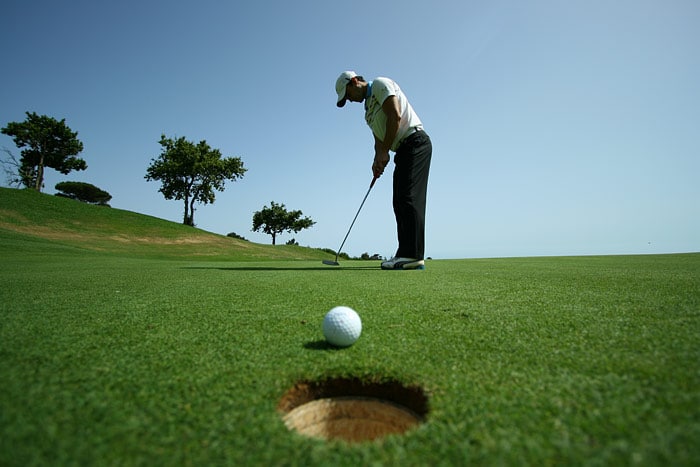So now your hooked – golf is your game. You think about it day and night and can hardly wait for the weekend and another shot at a new low score. There’s just one small problem – you want to improve your game. Your divots come two or three inches early, and nothing every goes where you hit it. The ball rarely goes higher than five feet in the air when you hit it, even with the short irons. New clubs might help but, how could any club fix the chunks, slices, hooks, and dozen other calamities that rear their ugly heads on almost every swing.
Consider that club manufacturers make different types of irons for every skill level from beginner to professional. They spend big bucks on R&D because their success depends on your success. They do everything possible to not only top each other but, to top their own prior year’s offerings. So, if you’re hacking away out there every weekend with a set of garage-sale-specials that have shiny grips, no sand wedge, and two nine irons, give some serious thought to upgrading your game with new clubs.
What Qualities Should Beginners Clubs Have?
Modern improvements irons will help you with your slice and forgive most slight to moderate mishits. They will also help you get height on the ball and add a few yards at the same time. Look for clubs with over-sized heads and a large cavity in the back. The larger club face provides more area to make contact. It also promotes much-needed confidence. Over-sized heads will also help you power through the deep second cut or the soft sand in fairway bunkers. The cavity pushes the club head’s weight to its perimeter which adds height and distance even on the thin mishits. Clubs with a wide sole will help if you tend to hit too far before the ball and “chunk” it.
Hybrids or Irons for the Three, Four, and Five?
Hybrids incorporates the best features of the fairway woods and Irons.
They have the same length shafts as their iron counterparts but more loft, and a compact fairway wood like head. This makes them more forgiving and easier to hit. Hybrids swing like an iron, but generate the distance of a fairway wood. They also work well out of the fairway bunkers and deep grass. Almost all amateurs and even some pros use hybrids, and so should you.
Steel or Graphite?
For the most part, more accomplished players prefer steel shafts, and beginners to mid-handicappers benefit most from graphite shafts. Skilled players use the feedback that steel clubs deliver to analyze their contact. The stiffer steel shafts also provide more control. The lighter and more flexible graphite shafts help increase swing speed and add extra “whip.” Most players average ten extra yards per club over steel shafts. Graphite shafts usually cost about twenty percent more than their steel counterparts.
What about Flex?
Manufacturers make recommendations on flex based on a player’s swing speed. You probably don’t know your average swing speed, use your average tee shot carry distance to get flex:
Manufacturers make recommendations on flex based on a player’s swing speed. You probably don’t know your average swing speed, so instead, use your average tee shot carry distance to get your flex:
- X Flex (Extra Stiff) – 270 + yards
- S Flex (Stiff Flex) – 240 to 270 yards.
- R Flex (Amateur or Senior) – 180 to 200 yards.
- L Flex (Ladies) – Less than 180.
Don’t think of these numbers as absolute but, more of a rough guide to point you in the right direction. Swing tempo also plays a role in determining you ideal flex.
Almost everyone that plays it has a love-hate relationship with game of golf. It’s frustrating, humbling, and at time aggravating. But, with a little practice, and the right set of clubs, golf can actually be very enjoyable and relaxing.
Improving your Golf Game Tips
Article Title: Smart tips to Improve Golf Game
Publisher Logo:
-
Helpful
(3.5)






















